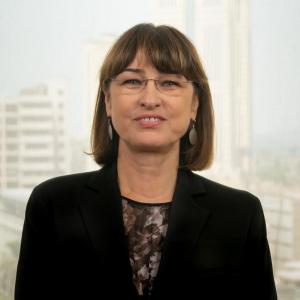Dr. Nevin Kabbaj, Minister of Social Solidarity
Dr. Maya Morsy, President of the National Council for Women
Ms. Evyenia Sidereas, U.S Embassy in Cairo Chargé d’affaires
Esteemed partners,
Dear colleagues,
It is a true honor to joint you today at the launch of the Joint Program “Ending Violence Against Women and Girls in Egypt” – a comprehensive partnership programme, which builds on existing national results, good practices, and which also sets milestones to combat all forms of violence against women and girls.
I would like to acknowledge with appreciation that gender equality and women’s empowerment has been a continuous priority for the Government of Egypt, and which remains committed to uphold the principles of the Convention on the Elimination of All Forms of Discrimination Against Women (CEDAW).
The national commitments have been translated into concrete actions in multiple sectors.
For example, a provision was added to the Egyptian Constitution to protect women from all forms of violence.
Similarly, legislation was amended to strengthen penalties against sexual harassment, Female Genital Mutilation (FGM), and to increase anonymity in cases of sexual violence.
Egypt’s updated ‘Vision 2030’ clearly recognizes the need to close the Gender Gap, and this is done not only by empowering women economically, socially, and politically, but also by eradicating all forms of discrimination and violence against them.
The National Strategy for the Empowerment of Egyptian Women 2030, and the National Plan for the Development of the Egyptian Family are other such national strategies to advance and elevate the role of women in the Egyptian society.
Distinguished participants,
United Nations in Egypt is proud to be a key partner to the GoE in empowering women and girls and addressing the needs of women and girls exposed to violence.
A testimony to our commitment is the five-year Cooperation Framework, signed last year between the GoE and the UN, which is among the few globally to recognizes women and girls’ empowerment as a standalone key pillar.
Through the provision of legal, medical, psychological and social services for women survivors of violence, and through large-scale community engagement and nation-wide programs, we work hand in hand with the Government to support women and their communities, and to also ensure that we do everything possible to prevent future generations of girls and women from experiencing violence.
A specific example is the Unified Services One-Stop-Center approach, which was adopted through a Ministerial Decree in 2021, and where key services are offered for women who experienced violence. The UN, incl. UNFPA, UN Women, UNODC, WHO and others, support this One-Stop Center approach, and we are glad it has been rolled out throughout Cairo.
Esteemed partners,
I am particularly pleased that through this Joint Programme, the UN will lead on a multi-year, large-scale endeavor to address and combat ALL FORMS of violence against women and girls across Egypt.
The Programme will adopt a prevention approach by examining social norms to end violence against women and girls, promoting community initiatives, and reinforcing legislation on issues such as FGM.
It will also adopt a response approach, expanding access to services for women and girls who have experienced violence.
This Program is also important as it offers an opportunity to address emerging new priorities in combatting VAWG such as: Technology-Facilitated Gender Based Violence that is becoming a significant threat to young women globally, and also in Egypt.
Addressing violence against women and girls in a meaningful and sustainable manner requires tackling the issue holistically and involves a broad set of expertise and solutions.
UNFPA has extensive expertise on the issue of VAWG, with lots of knowledge adopting multisectoral responses and strategies.
UN Women brings its wealth of experience in women’s empowerment, advocacy, and increasing access to social services.
CARE brings expertise along with longstanding partnerships with local NGOs, which are at the forefront of the grassroots efforts to combat violence against women and girls and have close ties to local communities and faith-based organisations, which allows for a greater understanding of the unique complexities of gender-based violence.
And of course, this Joint Programme aims to lift and draw from the leadership and expertise of the National Council for Women, the Ministry of Social Solidarity, the Ministry of Health and Population, as well as other line ministries and government agencies, such as the National Council for Childhood and Motherhood.
This comprehensive approach acknowledges the complexity of tackling violence against women and girls, and the fact that different partners bring essential components into this work.
In conclusion, I want to thank the Government of Egypt, as well as, the Government of the United States, including USAID, for your partnership with the UN.
We are convinced that to combat all forms of violence against women and girls, we must work together to support a society, where violence will not be tolerated, and where all individuals – men, women, boys, and girls – are empowered to live free from fear and harm.
And by doing so, we will build a more just and equitable world where no one is left behind.
I thank you.



